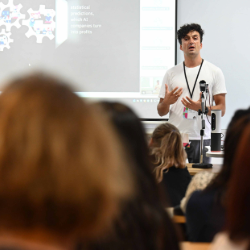-
Study
Study
Interested in studying at Northumbria? With 31,500 students, Northumbria is one of the largest universities in the country, offering courses on either a full-time, part-time or distance learning basis.
Discover more-
Undergraduate
- Undergraduate Study Degree
- Undergraduate Open Day & Events
- Application Guides
- Northumbria University UCAS Exhibitions
- Foundation Years
- Undergraduate Fees & Funding
- School & College Outreach
- Continuing Professional Development
-
Postgraduate
- Postgraduate Study Degree
- Postgraduate Research Degrees
- Postgraduate Open Days and Events
- Postgraduate Fees & Funding
- Flexible Learning
- Thinking about a Masters?
- Continuing Professional Development
- Change Direction
-
Student Life
- The Hub - Student Blog
- Accommodation
- Life in Newcastle
- Support for Students
- Careers
- Information for Parents
- Students' Union
- Northumbria Sport
-
-
International
International
Northumbria’s global footprint touches every continent across the world, through our global partnerships across 17 institutions in 10 countries, to our 277,000 strong alumni community and 150 recruitment partners – we prepare our students for the challenges of tomorrow. Discover more about how to join Northumbria’s global family or our partnerships.
Discover more-
Applying to Northumbria
- European Union
- Our London Campus
- Northumbria Pathway
- International Events
- Entry Requirements
- Agent Network
-
Northumbria Language Centre
- Faculty Requirements
- Acceptable English Requirements
- Pre-Sessional English and Study Skills
- Academic Language Skills Programmes (ALS)
-
International Fees, Funding & Scholarships
- International Undergraduate Fees
- International Undergraduate Funding
- International Masters Fees
- International Masters Funding
- International Postgraduate Research Fees
- International Postgraduate Research Funding
- International Money Matters
-
Life at Northumbria
- International student support
- The Hub - Student Blog
- Careers
-
International Mobility
- Current Northumbria Students
- Incoming Exchange Students
-
-
Business
Business
The world is changing faster than ever before. The future is there to be won by organisations who find ways to turn today's possibilities into tomorrows competitive edge. In a connected world, collaboration can be the key to success.
Discover more -
Research
Research
Northumbria is a research-rich, business-focused, professional university with a global reputation for academic quality. We conduct ground-breaking research that is responsive to the science & technology, health & well being, economic and social and arts & cultural needs for the communities
Discover more -
About Us
-
About Northumbria
- Our Strategy
- Our Staff
- Place and Partnerships
- Student Profiles
- Alumni Profiles
- Leadership & Governance
- Academic Departments
- University Services
- History of Northumbria
- Contact us
- Online Shop
-
-
Alumni
Alumni
Northumbria University is renowned for the calibre of its business-ready graduates. Our alumni network has over 237,000 graduates based in 178 countries worldwide in a range of sectors, our alumni are making a real impact on the world.
Discover more - Work For Us
What will I learn on this module?
This module focuses on advanced clinical skills assessment in community specialist practice and is a core module for those students undertaking the community specialist practice qualification (SPQ) pathways; district nursing, adult social care and general practice nursing. This module is for students studying either the full time or part time programmes. If you are studying full time, the delivery of this module will be in semester one of the programme. If you are studying part time, the delivery of this module will be year-long, starting in semester one, year one. This is to accommodate for the inclusion of the formative programme Practice Assessment Document (PAD), which is your record of ongoing achievement, with formative assessment of practice through year one of your programme.
You will be supported to strengthen and develop your knowledge base in relation to conducting, interpreting, and evaluating complex health and social care needs for adults, working in partnership with their families and carers. You will be drawing upon principles of person and family centred care to inform your specialist practice. You will develop your practice in addressing the physical and psychosocial dimensions within clinical assessment, taking into consideration epidemiology, community demography and social determinants of health and illness.?? Advanced communication skills will be developed, and you will be supported to apply strategies to deliver person-centred care in complex circumstances.
The module will have a distinct focus on common as well as complex conditions encountered when caring for people accessing services relevant to your specific field of practice.. Each pathway has a bespoke route to learning, focusing on systems and complexities relevant to your pathway. This will be reflected in your summative assessment, based on real-world clinical situations assessed via an OSCE. Teaching will adopt a body systems approach with a range of seminars, practical workshops, tutorials, and Online Supported Learning (OSL) packages. Sessions will focus specifically on health conditions examining the physiology, pathophysiology, and relevant pharmacology, as identified in the co-production of this module with our stakeholders and employing partners.?In addition, you will have the opportunity to understand the application of genomics and epigenetics in informing person and family centred care.?Frailty, end of life-care and the management of long-term conditions will also form part of your educational journey, allowing for the exploration of contemporary themes that will connect key learning themes structured throughout the programme.
You will develop your autonomous practice and ability to lead, and manage whole episodes of care for adults, understanding when to admit, discharge or refer as appropriate.?You will have the opportunity to advance your specialist knowledge, critical thinking, and decision-making skills, undertaking comprehensive clinical assessments, focusing on practice-based scenarios.??Similarly, you will be supported to analyse a range of informatics, including clinical investigations, to assist your assessment and diagnosis, distinguishing between normal and abnormal findings across the differing needs of complex and varied populations. You will also demonstrate your ability to accurately document your findings, identifying pertinent clinical and care solutions and effectively communicate these appropriately within the inter-professional team as well as to those involved as part of the care. This will include demonstrating necessary skills to plan care in partnership, maximising opportunities for self-management.
For part-time students, because this module includes your Practice Assessment Document (PAD) which is your ongoing record of achievement. You will be supported in practice by a Practice Assessor (PA) as well as Practice Supervisors (PS) as part of your formative assessment. You will receive semesterly progress review meeting support from an appropriate Academic Assessor (AA) and your PA in your clinical placement setting. These will be held at each semester throughout year one of your programme, where you will gain experience and insight into your professional role, ensuring you are supported with the achievement of the required NMC standards of proficiency.?
How will I learn on this module?
This module draws upon the department and universities approach to universal design for learning principles, recognising that each person has their own learning needs and styles. As such, this module provides opportunities to engage in directed learning activities as well as self-directed learning, critical evaluation, reflection, knowledge, and skills acquisition, including collaborative working, which underpins and shapes teaching and learning on your programme of study.? The module will be delivered through a combination of face-to-face seminars, practical workshops with practice-based scenarios using simulation to enable formative development of knowledge and skills including, tutorials as well as tutor directed learning using Online Supported Learning (OSL), packages.??
The assessment strategy adopts an authentic assessment approach, drawing on real world employment tasks, addressing both the theoretical and practical elements of the module, and as such, your summative assessment will be an Objective Structured Clinical Examination (OSCE), relevant to the advanced clinical assessment of those being cared for within a community setting. You will be taught by appropriately skilled experts who will have significant knowledge and experience relevant to the taught session, allowing for a diverse variation of academic delivery across the module.?You will also have the opportunity for formative assessment in tutorials, to prepare for your summative assessment.
Each pathway will have bespoke teaching relevant to you specialist area of practice. Each pathway will focus specifically on the contemporary needs of your clinical practice and will be evident in the field-specific sessions delivered by the programme team. You will also have the opportunity to work alongside students from other pathways, engaging in simulated learning and taking a multi-disciplinary approach to clinical assessment and patient management. Your learning will be tailored and relevant to your field of specialist clinical practice, reflected in your summative assessment. The programme utilises a core lecture and applied seminar approach to shared modules across pathways. You will be required to attend the seminars that are identified as being a core component of your recognised curriculum or standard. Students will be required to complete the assessment applied to their programme pathway.
How will I be supported academically on this module?
You will be supported by the module team who will guide your academic learning and assessment throughout the module. This module utilises Universal Design for Learning (UDL) principles in the design of teaching, learning and student assessment. UDL principles are designed to assist students to achieve and excel in their studies irrespective of their individual learning needs and as such UDL is designed to promote inclusive curriculum design. The Module Lead will provide you with an overview of the module and guide you in your studies and will offer opportunities to discuss content, issues, and assessment feedback. Constructive feedback is given on both formative and summative components. Each module is supported by Blackboard Ultra and all modules adhere to the university’s minimum standards. The site includes module information, assessment information, power-point presentations and Online Supported Learning OSL packages, Peer support is encouraged and facilitated via group work embedded within this module and your programme of study. Group tutorial and formative sessions delivered through practice-based learning sessions will help you prepare for the summative assessment. Your Programme Lead and Personal Tutor are also available to offer guidance on academic support throughout the programme. The University Libraries at both Coach Lane and City Campus offer an extensive collection of material, both hard copy and electronic, access to international databases and training in information retrieval. A variety of study-skills-related help sheets, and online videos can be found on the library Skills Plus site. You can also access a range of student support and wellbeing services via Student Central at Coach Lane Campus Library or by accessing the student support and wellbeing pages and Ask4Help via your electronic student portal.? Part time students will receive academic support from an allocated AA relevant to your pathway of study.
What will I be expected to read on this module?
All modules at Northumbria include a range of reading materials that students are expected to engage with. The reading list for this module can be found at: http://readinglists.northumbria.ac.uk
(Reading List service online guide for academic staff this containing contact details for the Reading List team – http://library.northumbria.ac.uk/readinglists)
What will I be expected to achieve?
Knowledge & Understanding:
Demonstrate ability to effectively conduct a comprehensive clinical assessment, focusing on practice-based patient scenarios relevant to your field of practice.
Interpret, synthesise, and utilise contemporary evidence as part of effective clinical judgement and decision-making within the assessment process.
Recognise abnormal physical features and pathophysiology in association with diagnostic test results interpret clinical and psychosocial data and recognise the ill and/or deteriorating patient.
Intellectual / Professional Skills & Abilities:
Demonstrate the application of advanced skills in articulating, accurately documenting and defending your clinical judgements and actions, critically evaluating emergent findings to inform case management
Personal Values Attributes (Global / Cultural awareness, Ethics, Curiosity) (PVA):
Demonstrate the ability to work independently and collaboratively with peers, colleagues, and service users to assess, plan and lead care high quality care in accordance with legal, professional, and ethical principles.
How will I be assessed?
Formative assessment -Full Time
This will be ongoing throughout the module; you will engage in interactive self-assessment via the ELP; simulations and taught sessions.
You will have the opportunity to engage in an interactive tutorial to prepare you for your summative assessment. In addition, group work within class will provide the opportunity for informal peer assessment.
(MLO’s 1-5)
Formative assessment – Part Time
This will be ongoing throughout the module; you will engage in interactive self-assessment via the ELP; simulations and taught sessions. Field specific group tutorials will provide the opportunity for informal peer assessment.?
(MLO’s 1-5).??
?
You will have the opportunity to engage in an interactive tutorial to prepare you for your summative assessment.?
?
You will also have your PAD document which is your record of ongoing achievement. You will receive organised tutorial support throughout the year where progress will be formatively assessed.?
Summative assessment- Full and Part Time:
This will be an Objective Structured Clinical Examination (OSCE), which will assess your ability to conduct a comprehensive clinical assessment, summarise your main findings and defend your plan of action.
During this assessment you will be expected to complete 2 stations of 30 minutes duration. Each station will provide you with a practice-based scenario relevant caring for babies, children, young people, and families, on which to base your clinical assessment, summary, and plan case management. (MLO’s 1-5)
You must achieve a pass in both stations to pass the summative assessment.
Station 1 – 50% weighting??
Station 2 – 50% weighting??
?
If you refer on one or more station(s), you will be reassessed on these referred stations only. Your marks and feedback will be provided electronically via Blackboard Ultra.
Pre-requisite(s)
n/a
Co-requisite(s)
n/a
Module abstract
This module will help you to advance your clinical assessment skills, critical thinking and decision-making skills through comprehensive clinical assessment. This module is for students studying either the full time or part time programmes. If you are studying full time, the delivery of this module will be semester one of the programme. If you are studying part time, the delivery of this module will be yearlong, starting in semester one, year one. This is to accommodate for the inclusion of the programme Practice Assessment Document (PAD), which is your record of ongoing achievement, with formative assessment of practice through year one of your programme. This is a practice focused module where you will have the opportunity to advance your critical thinking and decision making through developing enhanced knowledge and skills in relation to comprehensive clinical assessment based on community and primary care clinical settings. During this module you will be able to evaluate routine clinical investigations, assess the severity of symptom complexes, explore both physical and mental health dimensions of assessment. A range of communication skills will be developed including effectively communicating findings to other members of the inter-professional team and service users. A systems-based approach is used during the module to provide you with the clinical skills and underpinning theoretical evidence to undertake clinical consultation and assessment. This module will enable you to be able to recognise the early onset of acute illness and provide objective clinical data to multi-disciplinary colleagues, enhancing patient safety and the effectiveness of patient care. You will apply your analytical and assessment skills to a range of scenarios and, from the interpretation of your findings, formulate a plan of care, which is compatible with the needs of the service user and the practice context. Learning will be supported through a combination of online supported learning/face to face lectures and seminars, On-line Supported Learning (OSL), practice-based scenarios facilitated in the simulation suite, and small group tutorials. The assessment strategy addresses both the theoretical and practical elements of the module, and your summative assessment will be an Objective Structured Clinical Examination (OSCE). This module will prepare you for your specialist role, with learning outcomes benefiting all aspects of your practice, helping to provide you and your peers with contemporary knowledge, skills and values desired in the workplace. Part time students will also be formatively assessed on their PAD throughout the year.
Course info
Credits 20
Level of Study Postgraduate
Mode of Study 2 years Part Time
1 other options available
Location Coach Lane Campus, Northumbria University
City Newcastle
Start September 2024
All information is accurate at the time of sharing.
Full time Courses are primarily delivered via on-campus face to face learning but could include elements of online learning. Most courses run as planned and as promoted on our website and via our marketing materials, but if there are any substantial changes (as determined by the Competition and Markets Authority) to a course or there is the potential that course may be withdrawn, we will notify all affected applicants as soon as possible with advice and guidance regarding their options. It is also important to be aware that optional modules listed on course pages may be subject to change depending on uptake numbers each year.
Contact time is subject to increase or decrease in line with possible restrictions imposed by the government or the University in the interest of maintaining the health and safety and wellbeing of students, staff, and visitors if this is deemed necessary in future.
Useful Links
Find out about our distinctive approach at
www.northumbria.ac.uk/exp
Admissions Terms and Conditions
northumbria.ac.uk/terms
Fees and Funding
northumbria.ac.uk/fees
Admissions Policy
northumbria.ac.uk/adpolicy
Admissions Complaints Policy
northumbria.ac.uk/complaints












.png?h=162&w=275&modified=20240508204039&hash=E7730891F70B0846DBED986B881F8605)

